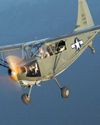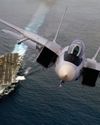Prøve GULL - Gratis
BACKSTREET BRAWLER
Flight Journal
|November - December 2023
A young man, his Hurricane and the Battle of Britain

If Hollywood had its way with history, the Supermarine Spitfire with its long slender fuselage and graceful elliptical wing would most likely be portrayed as the lone defender over the White Cliffs of Dover during the Battle of Britain. Although the Spitfire played an important role in beating back the daily Luftwaffe raids, it was the tenacity of the pug-nosed Hawker Hurricanes of the RAF that bore the brunt of aerial combat during England’s darkest days. The Hurricane was slower than the Spit and it took longer to climb to altitude, but once it got there, the stubby little fighter jumped in and out of scrapes like a backstreet brawler.
Although the RAF Hurricane had its nose bloodied many times over by the German raiders, it was able to stay upright as it absorbed many punishing blows. British estimates credit the Hurricane with four-fifths of all German aircraft destroyed during the peak of the battle—July through October of 1940. Follow along with Hurricane pilot Robert W. “Bob” Foster as he slugs it out with the mighty Luftwaffe high over England.

Learning the ropes
Denne historien er fra November - December 2023-utgaven av Flight Journal.
Abonner på Magzter GOLD for å få tilgang til tusenvis av kuraterte premiumhistorier og over 9000 magasiner og aviser.
Allerede abonnent? Logg på
FLERE HISTORIER FRA Flight Journal

Flight Journal
ELLIPTICAL ELEGANCE
Flying and evaluating the Seafire Mark III
4 mins
November - December 2025

Flight Journal
IRON DOG
Fighting the Pacific and the P-39 at the same time
14 mins
November - December 2025

Flight Journal
Fighter Pilots: A Warrior Clan
TAKE A HARD LOOK at the two young men in these photos. Do they look as if they were bent on killing one another? On the left we have a young, unknown enlisted Japanese pilot standing in front of a Nakajima Ki-27 \"Nate,\" one of Japan's earliest monoplanes that led to the much vaunted Zero.
3 mins
November - December 2025

Flight Journal
KEN WALSH THE FIRST CORSAIR ACE
Medal of Honor pilot's combat adventures
12 mins
November - December 2025

Flight Journal
Big Chief's Little Chief
Thunderbolt action with the Wolf Pack
11 mins
November - December 2025

Flight Journal
ENEMY PILOTS SPEAK Voices from the other side
All too often American students of air warfare forget that enemy aircraftwhether Messerschmitts or MiGs-were flown by human beings with the same motivations and traits as Allied airmen. More often than not, the only difference between friend and foe was the paint on the airplane and where they landed. Therefore, we've assembled a variety of accounts from WW II Axis fighter pilots, men who were more than simply targets.
11 mins
November - December 2025

Flight Journal
FLYING THE FW 190
A legend gets checked out in the Butcher Bird
15 mins
November - December 2025

Flight Journal
DOUBLE-THEATER ACE
The fearless missions of legendary fighter pilot Col. John D. Landers
12 mins
November - December 2025

Flight Journal
WARBUG IN THE PACIFIC
Surviving combat in a Stinson OY-1/L-5
10 mins
September - October 2025

Flight Journal
WINGS OF THE FLEET
Celebrating the U.S. Navy's 250-year legacy
9 mins
September - October 2025
Translate
Change font size

